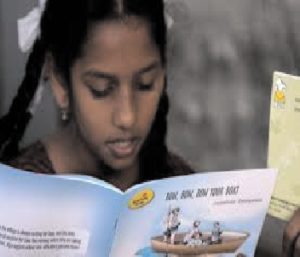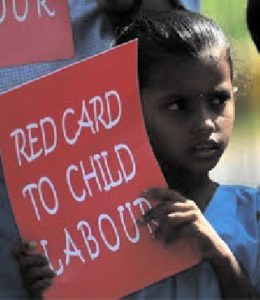Pan African Girl Child Education Campaign
 Worldwide, girls constitute over half of the children out of school. Only 30 percent of all girls are enrolled in secondary school. In many countries, less than one third of university students are women. The average sub-Saharan African girl from a low-income, rural household gets less than two years of schooling and never learns to read and write, to add and subtract, as opposed to the average African boy especially in Sub-Saharan Countries, who fully completes primary education.
Worldwide, girls constitute over half of the children out of school. Only 30 percent of all girls are enrolled in secondary school. In many countries, less than one third of university students are women. The average sub-Saharan African girl from a low-income, rural household gets less than two years of schooling and never learns to read and write, to add and subtract, as opposed to the average African boy especially in Sub-Saharan Countries, who fully completes primary education.
The false view persists in many cultures that it is more beneficial to send the son to school because sons will stay in the family, whereas girls leave the family to join her husband’s family after she gets married. This reinforces gender stereotypes that a women’s place is in the home taking care of children, cooking, cleaning and doing other unpaid work.
In more than 100 countries around the World especially in Africa, school is not free and many parents cannot afford the tuition or the cost of uniforms.
Faced with social and economic barriers, parents often chose to invest in their son’s, and not their daughter’s education. Unsafe travel over long distances to and from school and the lack of separate latrines (outdoor toilets) for girls are other reasons why millions of girls are forced to stay out of school and denied an education. These factors also explain why girls drop out at much higher rates and at earlier ages, sometimes only completing two years of school; compared to a boy who is more likely to make it to secondary school and beyond.
The high rate of child marriage in many countries means, many girls never had the opportunity to go to school or are forced to drop out of school at a young age.
Education is crucial for the empowerment and emancipation of girls and women, and the realization of all other human rights. Educating a girl has a transformational effect that changes communities and societies. More importantly, women having the responsibility of nursing and raising the child on behalf of the family. Comparing children being raised by uneducated parent and those raise by educated parents are obvious:
- Education empowers girls by introducing new ways of thinking about traditions and issues, and challenges traditionally held gender roles.
- Education helps a girl to respect herself and to be respected by others.
- Education drastically reduces child marriage. On average, a girl with 7 years of education will marry 4 years later and have 2.2 fewer children.
- Studies have shown that a girl who completes basic education is three times less likely to contract HIV.
- Knowledge and skills learned at school will be passed onto her children and will eventually trickle down to the entire community.
- Education is essential for a strong economy. One extra year of school boosts a girl’s future wages by 10-20 percent.
- Children born to educated mothers are two times more likely to survive past the age of 5.
- Education fosters critical thinking skills, which are essential for effective leaders and democracy.
- More women are needed to solve global problems!
 In 2000, the United States, Nigeria and 162 other countries signed the U.N. Millennium Development Goals (MDGs) Declaration, with the target of ending global poverty by 2015. MDGs 2 and 3 commit signing countries to ensuring that by 2015, every boy and girl will be able to complete primary school thereby, eliminating gender disparity at all levels of education.
In 2000, the United States, Nigeria and 162 other countries signed the U.N. Millennium Development Goals (MDGs) Declaration, with the target of ending global poverty by 2015. MDGs 2 and 3 commit signing countries to ensuring that by 2015, every boy and girl will be able to complete primary school thereby, eliminating gender disparity at all levels of education.
Education: A Social Right and a Development Imperative
Education’s importance has been emphasized by a number of international conventions, including the Universal Declaration of Human Rights and the Programme of Action of the 1994 InternationalConference on Population andDevelopment. The Fourth World Conference on Women, held in Beijing in 1995, recognized that women’s literacy is key to empowering women’s participation in decision making in society and to improving families’ well-being. In addition, the United Nations has articulated the Millennium Development Goals (MDGs), which include goals for improved education, gender equality, and women’s empowerment. The MDGs emphasize education’s essential role in building democratic societies and creating a foundation for sustained economic growth.
Girl Child Education contributes directly to the growth of national income by improving the productive capacities of the labor force. A recent study of 19 developing countries, including Egypt, Jordan, and Tunisia, concluded that a country’s long-term economic growth increases by 3.7 percent for every year the adult population’s average level of schooling rises. Thus, Girl Child Education is a key strategy for reducing poverty, especially in Africa. According to the United Nations Population Fund, countries that have made social investments in health, family planning, and education have slower population growth and faster economic growth than countries that have not made such investments.
In the increasingly open global economy, countries with high rates of illiteracy and gender gaps in educational attainment tend to be less competitive, because foreign investors seek labor that is skilled as well as inexpensive. Various global trends pose special challenges to women who are illiterate or have limited education. Economies’ export orientation and the growing importance of small and medium-sized enterprises create opportunities for women, but women need the appropriate education and training to take full advantage of these opportunities.
In addition, the benefits of female education for women’s empowerment and gender equality are broadly recognized:
- As female education rises, fertility, population growth, infant and child mortality fall and family health improves.
- Increases in girls’ secondary school enrollment are associated with increases in women’s participation in the labor force and their contributions to household and national income.
- Women’s increased earning capacity, in turn, has a positive effect on child nutrition.
- Children — especially daughters — of educated mothers are more likely to be enrolled in school and to have higher levels of educational attainment.
- Educated women are more politically active and better informed about their legal rights and how to exercise them.
African countries generally have lower levels of women’s education and labor force participation than other regions with similar income levels. The interaction between the region’s economic structure and its conservative culture, in which traditional gender roles are strongly enforced, is largely responsible. Men in Africa Continent are more likely to have direct access to wage employment andcontrol over wealth, while women are largely economically dependent upon male family members.
Cultural and Economic Factors That Reinforce the Gender Gap
Gender discrimination in Africa is sometimes codified in law, frequently in family laws or civil codes. In many countries in the region, women must obtain permission from a male relative, usually a husband or father, before seeking employment, requesting a loan, starting a business, or traveling. Such laws often grant women a smaller share of inherited family wealth. As a result, families tend to make greater investments in education for boys than for girls.
The results of 2000 Demographic and Health Survey (DHS) provide insights into families’ preferences for investing in their children’s education. Women with children ages 6 to 15 were asked, “If parents have one son and one daughter
and can send only one child to the university, which child should they send?” While 53 percent of the women said that the decision should depend on the children’s capabilities, 39 percent said that the son should go to the university, compared with only 8 percent who said that the daughter should go. The survey also found that mothers of children who had never attended school were more likely to cite the cost of education as a reason for not educating their daughters than for not educating their sons.
However, the situation in Africa is slowly changing. Women activists, who generally come from the educated segments of society, are challenging the status quo; demanding equality in the family and society; and calling for women’s economic, political, and social empowerment. The trend’s intensity varies by country but is visible even in relatively conservative nations. In addition to facing political pressure for reform, countries are dealing with economic changes that are creating an impetus for women to become more active outside the home. As the region’s cost of living rises rapidly, families are increasingly forced to depend on the additional income that female family members can provide.
Education’s Effects on Reproductive Choices and Employment
Education helps women take advantage of opportunities that could benefit them and their families, preparing women for the labor force and helping them understand their legal and reproductive rights.
Female Reproductive Health
Education is the single most important determinant of both age at marriage and age at first birth in African countries, since women in Africa tend to give birth soon after marriage. Among married Egyptian women ages 25 to 29, for instance, those with no education had married at age 18, on average, and had their first child by age 20; those with a secondary or higher education married at an average age of 23 and had their first child by age 25. Studies have showed that 22 percent of girls 15 to 19 years old who had no education or who had not completed primary school were already mothers or pregnant, compared with only 2 percent of girls who had completed secondary or higher education.
Educated women generally want smaller families and make better use of reproductive health and family planning information and services in achieving their desired family size; Moroccan women with at least some secondary education had, on average, half as many children as women with no education. Women with more education also tend to have healthier families. In Egypt, for example, children born to mothers with no formal education were more than twice as likely to die as those born to mothers who had completed secondary school. According to the 2000 DHS, Egyptian women with less education wereless likely to receive antenatal care: Only 34 percent of Egyptian mothers with no education received antenatal care, comparedwith 75 percent of those with a high school or college degree.
The time to act is now, the benefits of empowering the Girl Child are too numerous to outline and their future too important to ignore, therefore make your voice heard through your support to rekindle the hope of African Girl Child.
Pan African Girl Child Education Campaign
Worldwide, girls constitute over half of the children out of school. Only 30 percent of all girls are enrolled in secondary school. In many countries, less than one third of university students are women. The average sub-Saharan African girl from a low-income, rural household gets less than two years of schooling and never learns to read and write, to add and subtract, as opposed to the average African boy especially in Sub-Saharan Countries, who fully completes primary education.
The false view persists in many cultures that it is more beneficial to send the son to school because sons will stay in the family, whereas girls leave the family to join her husband’s family after she gets married. This reinforces gender stereotypes that a women’s place is in the home taking care of children, cooking, cleaning and doing other unpaid work.
In more than 100 countries around the World especially in Africa, school is not free and many parents cannot afford the tuition or the cost of uniforms.
Faced with social and economic barriers, parents often chose to invest in their son’s, and not their daughter’s education. Unsafe travel over long distances to and from school and the lack of separate latrines (outdoor toilets) for girls are other reasons why millions of girls are forced to stay out of school and denied an education. These factors also explain why girls drop out at much higher rates and at earlier ages, sometimes only completing two years of school; compared to a boy who is more likely to make it to secondary school and beyond.
The high rate of child marriage in many countries means, many girls never had the opportunity to go to school or are forced to drop out of school at a young age.
Education is crucial for the empowerment and emancipation of girls and women, and the realization of all other human rights. Educating a girl has a transformational effect that changes communities and societies. More importantly, women having the responsibility of nursing and raising the child on behalf of the family. Comparing children being raised by uneducated parent and those raise by educated parents are obvious:
- Education empowers girls by introducing new ways of thinking about traditions and issues, and challenges traditionally held gender roles.
- Education helps a girl to respect herself and to be respected by others.
- Education drastically reduces child marriage. On average, a girl with 7 years of education will marry 4 years later and have 2.2 fewer children.
- Studies have shown that a girl who completes basic education is three times less likely to contract HIV.
- Knowledge and skills learned at school will be passed onto her children and will eventually trickle down to the entire community.
- Education is essential for a strong economy. One extra year of school boosts a girl’s future wages by 10-20 percent.
- Children born to educated mothers are two times more likely to survive past the age of 5.
- Education fosters critical thinking skills, which are essential for effective leaders and democracy.
- More women are needed to solve global problems!
In 2000, the United States, Nigeria and 162 other countries signed the U.N. Millennium Development Goals (MDGs) Declaration, with the target of ending global poverty by 2015. MDGs 2 and 3 commit signing countries to ensuring that by 2015, every boy and girl will be able to complete primary school thereby, eliminating gender disparity at all levels of education.
The Pan African Girl Child Education Foundation 2019 is organizing an Award Ceremony that will showcase women in Nigeria and in the Diaspora, that have distinguished themselves in various field of endeavours. The Award Ceremony is titled: Prize For Noble African Women in Leadership.
The Award Ceremony will hold as follows:
Date: December 3, 2019
Venue: National Merit Ward House, Maitama, Abuja.
Nomination into various categories of award is currently in progress.
To nominate, please send the name,organization, telephone number and field of endeavours to info@panafricangirlchildeducation.org
Shortlisted Nominated Awardee will be contacted via their telephone number(s).
For further information, please contact:
Visit Pan African Girl Child Education’s website. (www.panafricangirlchildeducation.org)
THE NEED FOR PAN AFRICAN GIRL CHILD EDUCATION CAMPAIGN
Pan African Girl Child Education Foundation is a Non-government Organization established to stimulate international policy debate on the problems of Girl Child Education all over Africa, especially in the rural areas. We find this prevalent neglect of the educational and other needs of the girl child totally unacceptable and are determined to take the necessary actions, in conjunction with other stakeholders, to stop this practice on the continent of Africa.
Pan African Girl Child Education campaign (PAGCEC) was officially flagged-off in Nigeria at the International Conference Centre, Abuja on 23rd March, 2015, with the “Aims to Support, Contribute and Sponsor over 100,000 Girl Children in Nigeria and other African Countries to acquire qualitative and quantitative education”. This is to ensure that girl children achieve their educational pursuits to enable them build their leadership potentials and contribute to the development of African continent.
It is difficult to trace all the plans and conversations that led to the joint efforts on tackling Pan African Girl Child Educational Problems. Like many other similar ideas, it grew out of both a series of informal conversations over many formal and informal discussions during meetings. The passionate contributions of many people and institutions coalesced to cultivate the networks, connections and intellectual curiosity required to found this foundation.
Now, with its rapidly growing membership strength, composed of very successful and notable leaders from all works of life, the PAGCEF has become one of the triumvirates of the practice, research, and teaching on matters relating to Women empowerment and emancipation, especially the girl child. It is hoped that more individuals and organizations will join us to promote this course.
Now, the challenge is that of the transition from incremental progress to transformative impact on a larger society. This requires aligning and scaling up corporate sustainability efforts and partnerships on a massive scale. The official flag off of PAN AFRICAN GIRL CHILD EDUCATION CAMPAIGN has put forward this new ideology and began a process of engaging business participants and key stakeholders in Human Capital Development in Africa, a Project we envisage to cut across the entire length and breadth of the African continent. With this mandate, we know for sure that, good spirited individuals and organizations will continue to support our collective dreams, especially, in promoting girl child education.
Ambassador Hanadi Marwan Ayoubi
President
Office Address:
Suite 40A, 2nd Floor
M.I.B Plaza
1st Avenue, Gwarinpa
Abuja, Nigeria
E-Mail: info@panafricangirlchildeducation.org
